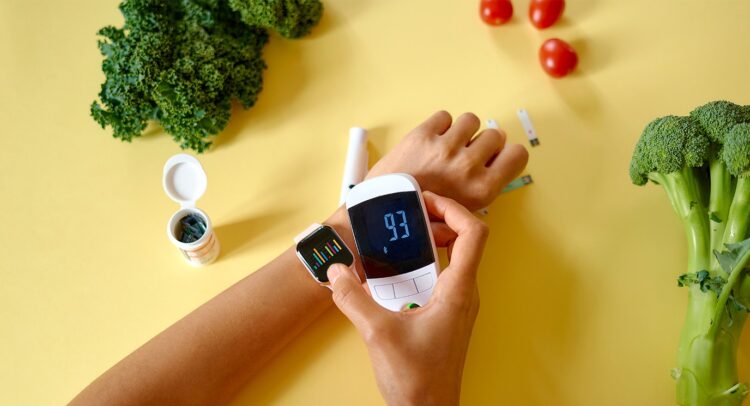If you’re feeling wiped out by 3 p.m., craving sugar after dinner, or dealing with sudden mood dips, you might be riding the blood sugar rollercoaster—and not in a good way.
Many women in their 40s and 50s blame hormones or age. But in most cases, unstable glucose levels are the real issue hiding beneath the surface. It’s not always about extremes. Often, your body just needs you to stop ignoring the small daily habits that throw it out of rhythm.
Here’s how to support your body and reclaim stable energy without guilt or guesswork.
Table of Contents
Key Highlights
- Blood sugar swings can show up as fatigue, mood changes, and midsection weight gain.
- Stress and poor sleep disrupt glucose balance more than many people realize.
- Meals rich in fiber, protein, and fat prevent crashes and cravings.
- Movement after meals improves insulin sensitivity naturally.
- A blood sugar supplements may help smooth out fluctuations.
- Tiny, consistent shifts can lead to real long-term balance.
Supportive Supplements Can Help Fill the Gaps

Sometimes food, sleep, and movement aren’t enough to bring everything back into balance. That’s where gentle supplementation can help—especially for women under chronic stress or perimenopausal shifts.
The right blend of nutrients supports your body’s natural regulation process.
Key supplements to consider:
- Cinnamon extract: improves insulin sensitivity
- Berberine: shown to reduce fasting glucose
- Magnesium: supports sleep and reduces blood sugar fluctuations
- Chromium: helps your cells use insulin more effectively
If you’re curious about natural support, try a blood sugar supplement that contains some of these compounds. Quality matters. Choose a formula with transparent labeling and no fillers.
Supplements aren’t shortcuts—but they can be helpful stepping stones.
Food Timing and Balance Matter Most
The order and makeup of your meals determine how your blood sugar behaves through the day. If you usually start with toast and coffee, your glucose will spike, then plummet. That crash leads to irritability, cravings, and poor focus. Over time, those repeated spikes exhaust your system.
Build your meals with this in mind:
- Eat within 90 minutes of waking
- Include 20–30 grams of protein at each meal
- Combine fiber, healthy fats, and slow carbs
One example: grilled salmon, sautéed spinach, a few roasted sweet potato cubes, and olive oil drizzle. No extreme measures—just the right mix.
When you feel the afternoon slump, resist the quick sugar fix. Instead, reach for something that stabilizes. A boiled egg or a handful of pumpkin seeds can calm your system far better than a muffin.
Stress Affects Blood Sugar More Than You Think

Many women underestimate how much stress impacts their glucose. You may eat perfectly but still struggle with symptoms if you’re operating under constant tension.
Your body releases cortisol in response to pressure—deadlines, arguments, even overstimulation. Cortisol signals your liver to release glucose, thinking you need to run or fight. But in modern life, there’s nowhere for that extra sugar to go.
When stress is daily and unmanaged, blood sugar stays elevated. That leads to sleep disruption, belly fat storage, and burnout.
You don’t need to meditate for hours. You need short, consistent breaks to switch off cortisol. A quiet morning stretch. A five-minute breathing pause. A slow walk after an intense call. That’s how you reclaim your baseline.
Movement That Lowers Glucose Naturally
Physical activity pulls glucose out of your bloodstream and into your cells—no special gear required. Movement gives your insulin a break. It lets your muscles handle the load.
Start simple. Begin with:
- A brisk 10-minute walk after meals
- Light bodyweight squats or pushups
- Slow yoga or mobility work on rest days
What matters is frequency. Every bit counts. You don’t need to crush workouts. You need to move with intention, especially after eating.
Walking after dinner is especially powerful. Your body is still processing food, and gentle movement helps reduce the spike that naturally happens after a meal.
Blood Sugar Spikes Feel Subtle—but They Add Up
You may not feel a dramatic change when your blood sugar spikes. But small symptoms add up over time. Pay attention to the signs:
You feel tired after meals.
You crave something sweet right after dinner.
You wake up at 3 a.m. and can’t get back to sleep.
You feel “hangry” when meals are delayed.
Each of those is a message from your body. Not one to fear—but one to respect.
Instead of ignoring the signs, get curious. What triggered that drop? Was it a skipped meal, too much refined starch, or not enough sleep? Learning your patterns helps you respond, not just react.
Sleep and Blood Sugar Go Hand-in-Hand

Poor sleep makes your cells more insulin resistant. That means even a healthy meal will spike your glucose higher if you didn’t rest well the night before.
Short sleep also boosts hunger hormones. You’ll feel more drawn to sugar and less full from meals. That combo creates a dangerous cycle—tired, moody, craving, eating, crashing.
To support blood sugar through better sleep:
- Turn screens off at least 30 minutes before bed
- Keep your room cool and dark
- Try magnesium-rich snacks like sunflower seeds before bed
- Avoid eating too late, which can cause midnight spikes
When you sleep well, your glucose naturally stabilizes. It’s not a bonus—it’s a necessity.
Signs You’re Starting to Stabilize
When your body begins to stabilize, you’ll feel it long before lab results confirm it. Energy comes back. Mood swings soften. You stop needing coffee to survive the morning or sugar to get through the afternoon.
You may notice:
- Fewer crashes after meals
- Better sleep and fewer 3 a.m. wake-ups
- More stable moods and less reactivity
- Reduced cravings for sweets and carbs
- Weight around your belly becoming easier to lose
These are not random improvements. They are the reward for building consistency. No drama. Just alignment.
Final Thought: Your Body Wants Balance
You’re not broken. You’re not lazy. You’re just operating in a world that constantly works against your biology.
Blood sugar balance is not a diet. It’s a rhythm. One built on respect, curiosity, and care. No extremes. No shame.
Start where you are:
- Eat your next meal with balance
- Take a short walk after dinner
- Shut your screens early tonight
Your body already knows what to do. You just need to give it the space to do it.
